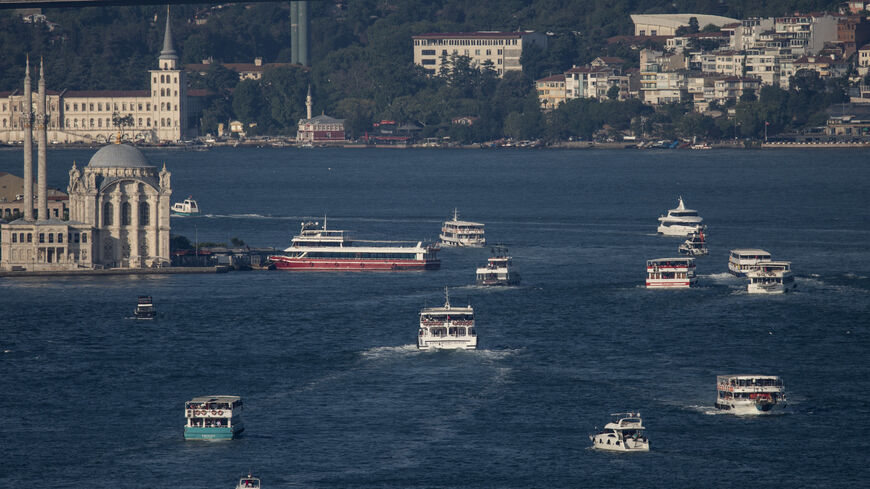With two weeks left before NATO's forthcoming summit in Vilnius next month, Al-Monitor has learned Turkey is upping its demands for the alliance's defense strategy, requesting that critical waterways connecting the Black Sea to the Aegean be referred to as the “Turkish Straits” rather than the "Straits."
Turkish President Recep Tayyip Erdogan also continues to pressure Sweden to crack down on alleged Kurdish terrorist sympathizers as a precondition for ratifying the Nordic country’s addition to the alliance.
In a phone call with NATO Secretary-General Jens Stoltenberg on Sunday, Erdogan said that Ankara was engaging constructively with Sweden but that the latter’s stiffening of its anti-terror legislation was “meaningless” so long as supporters of the outlawed Kurdistan Workers Party and its Syrian affiliates were permitted to stage demonstrations against Turkey in the Swedish capital. Stoltenberg announced today that a high-level delegation led by Turkish Foreign Minister Hakan Fidan and including intelligence officials would meet with their Swedish counterparts to assess whether further progress could be made ahead of the Brussels summit. No date was announced.
As diplomats race to predict whether Erdogan will cave at the last minute and greenlight Sweden’s membership at the summit set for July 11-12 in the Lithuanian capital, Turkey is piling separate demands on the alliance itself that threaten to hold up its new defense strategy, the most ambitious overhaul to be drafted since the end of the Cold War. The effort has gained added urgency in the wake of Russia’s February 2022 invasion of Ukraine.
Turkey’s objections were first touched upon briefly by The New York Times, which did not provide details. Reuters reported on June 16 that NATO defense ministers had failed to reach agreement on the new plans, which outline how the alliance would respond to a Russian attack, and said that one unidentified diplomat blamed Turkey for blocking them. The diplomat told Reuters that Ankara had declined to approve the document “over the wording of geographical locations, including with regard to Cyprus.”
The diplomat did not elaborate, but added that there was still an opportunity to resolve the issue before the NATO gathering.
The standoff continued today, well-informed sources told Al-Monitor on condition they not be identified. NATO’s Supreme Allied Command, which is responsible for all of NATO’s military operations, is resisting Turkey’s demands, which are not limited to Cyprus, the sources said.
Al-Monitor has learned that among other things, Turkey wants the text to refer to critical waterways connecting the Black Sea to the Aegean as the “Turkish Straits” rather than the "Straits." The 1936 Montreux Convention, which regulates maritime traffic through the Bosporus and Dardanelles straits and the Sea of Marmara that lies between them, refers to them simply as the “Straits.” While it may seem like more petulance, commentators suggest that the use of the term “Turkish Straits” could have legal implications that would give Turkey greater control over the bodies of water than it currently enjoys under Montreux and in ways that could undermine Western interests.
Yet NATO Military Committee documents dating back to the 1950s, when Turkey joined the alliance, refer to the “Turkish Straits.” The sources briefing Al-Monitor declined to clarify where the disagreement over usage of the term stemmed from, though some indicated that Greece opposes it and that the United Kingdom is mediating between the sides.
The talks on NATO’s new strategy are top secret, as the diplomat referenced by Reuters stressed.
Turkey’s stance is widely seen as part of its overall posturing on Sweden that aims above all to secure assurances from the Biden administration that it will be able to acquire F-16 fighter jets and upgrade kits whose sales are being blocked by the US Congress.
Turkey is also resisting plans for enhanced NATO-EU cooperation in the works since 2018, mainly over the status of Cyprus. The island in the eastern Mediterranean has remained divided since 1974 between the internationally recognized Greek Cypriot administration and the Turkish Republic of Northern Cyprus, which is protected by Turkish troops and recognized solely by Ankara. Cyprus is a member of the EU, but Turkey has blocked its membership in NATO and refuses to acknowledge its legitimacy. A UN-sponsored road map to reunite the island was backed by Erdogan and a majority of Turkish Cypriots. However, Greek islanders voted against the scheme in a 2004 referendum but Cyprus was permitted to join the EU nonetheless.
Cyprus has since used its EU membership to torpedo Turkey’s now-stalled membership talks. Turkey has similarly leveraged its NATO membership to stymie Greek efforts to foster links between Cyprus and the alliance.
Tensions between Turkey and Cyprus have escalated sharply in recent years over exploration and production rights for natural gas in the eastern Mediterranean. At the same time, Turkey and Greece continue to spar over energy and territorial rights in the Aegean Sea.
Another Turkish quibble, the sources briefing Al-Monitor said, was over references to terrorists and terrorism in NATO’s new strategy plan. Ankara wants the language to reflect the actions of groups that it labels as such.








